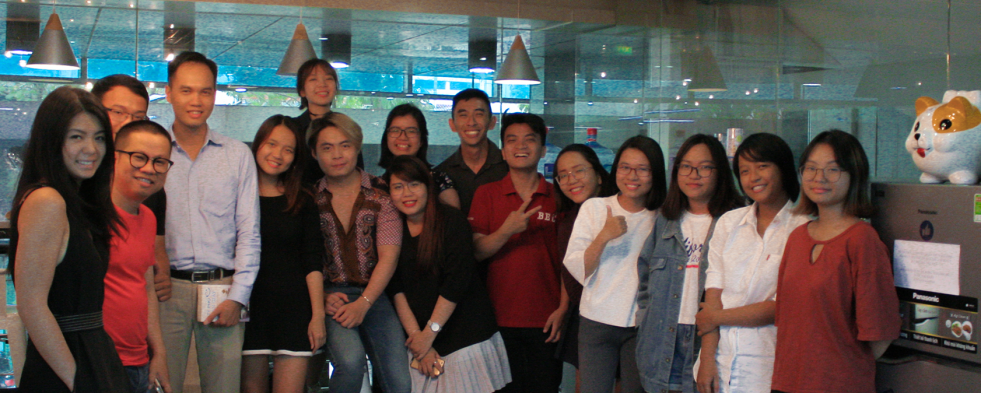
My 5Fs – To Orientate a Small Firm in Ever-Changing Industry
Hello there!
Are you my peer? Do you also run a small firm in an ever-changing industry?
I joined marketing 10 years ago; specifically, the dark side (agency) for 8 years and have never ceased to be amazed by how fast it changes, especially in a developing country like Vietnam. Truth is digital marketing agencies are small, not mentioning many too. One agency usually has 10+ employees then up to 100+, which is a very unusual case. For example, my company Wisdom Agency has 20+ people with 5 departments, which I consider “ok” considering 3,000+ competitors on the market.
Running a digital marketing is the hardest experience in my opinion. Top-to-down problems:
- Difficulties to maintain healthy cash flow?
- Acquiring new clients with endless pitching rounds
- Building a customer-centric culture for all employees
- Promoting creativity within all teams
- Recruiting and retaining talents
- More important, nurturing talents within the organisation
If you have encountered similar problems, then this article is for you. Otherwise, I don’t want to waste your time!
Easily- or hardly-driven, matured or developing industry, I feel lucky to work in digital marketing for the past years. Starting from the bottom to the top, seeing from the bottom to the top and learn how different a marketing agency is to other kinds of businesses and how to run it effectively. Strategy to grow a digital marketing agency may vary depending on size and services but I believe it relies primarily on 5 “Fs”. The first three are fundamental elements; the last two are competitive ones.
- Flat
- Fair
- Facilitator
- Flexible
- Fast
Flat: flat structure. It’s true when your employees have not exceeded 100 people. As a leader, you should be there and know all their full names, backgrounds and possibly bibliographies as much as you can. Then encourage a culture of openness and make them heard. There shouldn’t be many layers of hierarchy; otherwise it will kill creativity and scare off employees. One advantage of small company is feeling like home and therefore you should not lose it. The opposite of “feeling home” is excessive benefit package and inherited brand-name which is done by big MNCs because with MNCs there are “feeling like home” no more.
Fair: fair policies. The policies clearly define responsibilities and rewards. Small company means competition is close and always there. It’s a two-edged knife that can boost one firm to succeed or ruin it in a short time. For this reason, how to guide healthy competition within the company is crucial, which can only be supported by fair policies of responsibilities and rewards. If done wrong, chances are you will lose your very best employees. Even worse, they may even badmouth the company after they left.
Facilitator: be a facilitator of new ideas and the spirit of test-and-try. Remember there is no wrong idea! You have flat structure and fair policies altogether just to generate as many innovative ideas as possible. Criticism at this stage is toxic. I’ve never been an advocate of cutting-cost policy because it solves short-term problems and never gives way to ideas that help the company to frog-leap. Example: our whole world can move forwards until now is because of extraordinary ideas of the great Edison, Gates, Jobs etc. not the people who do the cost-cutting. If you still doubt my idea, read “Built to Last” by Jim Collins featuring case-study of the great company 3M who invests heavily on R&D.
Below are two other Fs you may achieve these two if you have done other three right
Flexible: I hope you too are a fan of Darwin because I deeply believe there is no fundamental strategy than the strategy of being flexible – be adaptable. It was proven by a history of millions of years so I don’t need to state it clearly here. Flexible firms for sure survive better in a fast-changing industry. Flat structure supports flexibility. Succinct job descriptions too, so don’t make them too long; you should have eager employees who are always ready to try new things and be rotated. Rotation from my point of view can be executed per semi-annual basis, together with structure audit and performance evaluation. In such a way, I to some extent don’t encourage heavy investment on fixed assets such as machines or platform until you know pretty sure what you need.
Fast: here comes the final one – the most important one too. When your firm is flexible, most likely it will be fast, and only the fastest one wins. Over countless conversations with peers, I noticed most of them had been tortured by the idea of “finding something unique” for their companies. Uniqueness is good! “When everyone is looking for uniqueness, everyone is unique just like everyone else.” How about this quote? It tortured me for a long time before too! Rather, I want to find something new and move there as fast as I can. In the era of technology, time is new competitive advantage. To me, it’s nothing than the art of doing a little better each day. Today, everyone talks about “social” and “mobile”, yet hardly you can find agencies that can do them well but I’m pretty sure some of them are already busy doing the others since they want to be different – they want to be unique. Critical question: why change course if the ship has not reached the first land yet?
Little about my company, I left my beloved job with IDM and started a new joint venture with friends which is named Wisdom Agency. Our mission is to provide strategies for middle-sized businesses who sometimes do not even realize they need it. Therefore, it is not an easy task. Still, I believe I was born to do the right things, not the easy one. So I think some ships will change courses and some ships will sink during the journey, but not mine. All we do is moving a little faster each day!!!
I wish you well leading yours too! And don’t change courses too soon …
Reference:
Nguyen Hai Minh
Managing Director
Wisdom Agency
Booking consultant now, if you need some advice!




